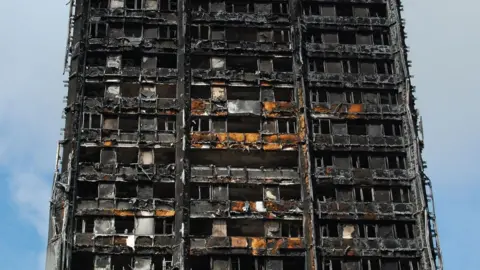Grenfell Tower: 'Twenty suicide attempts' since fire
 BBC
BBCAt least 20 survivors and witnesses of the Grenfell Tower fire have attempted suicide, a support network has said.
Silence of Suicide founder Yvette Greenway told the BBC's Victoria Derbyshire programme the number was based on conversations with residents.
Campaign group Justice4Grenfell said those working with survivors had heard of 20 suicide attempts, but the BBC has been unable to verify the figure.
A network of support is available, Kensington and Chelsea Council said.
Deputy leader Kim Taylor-Smith said the council was "committed to supporting those affected by this tragedy".
He said support included proactive work within the community and schools, a 24-hour NHS helpline and emotional support services provided by local community groups along with the Samaritans.
'Alcohol dependency'
Ms Greenway said many residents were unable to get images of the burning tower "out of their minds".
"There is a lot of alcohol and drug dependency," she said. "People are feeling isolated."
Ms Greenway said there was little confidence in "council-led" mental health services.
"We've been told workers are going around putting leaflets under hotel doors and not actually speaking to people," she said.
"There are going to be many more instances of PTSD [post-traumatic stress disorder], depression, anxiety and self-harming as people reach different stages of trauma.
"Everybody will be affected at different times.
"We need long-term mental health provision for the next three decades at least - maybe longer."
Survivor guilt
Judy Bolton, a nurse for 20 years who is now co-ordinating volunteers for Justice4Grenfell, said mental health support services needed to be rethought.
She said rather than waiting for survivors to actively seek help, services should instead "go to them".
Ms Bolton suggested there were multiple factors in why people were attempting suicide, including depression, survivor guilt and feeling unable to cope with the loss of loved ones.
"There just isn't the proper psychiatric help that people need," she said.
"They need trauma and bereavement counselling urgently.
"People are self-medicating to shut out the trauma.
"We were flooded with drug dealers preying on the traumatised.
"People saw their neighbours falling from a burning building.
"They saw children being dropped from the building.
"There are still ashes still blowing over us when the train goes past.
"We're being covered in the ash of our dead friends and relatives."
In a statement, Kensington Council said more than 800 people had been seen by a local response team and 700 people were spoken to by NHS health professionals at Notting Hill Carnival.
Screening for post-traumatic stress disorder has been provided for 330 people so far, according to council figures, and 66% of those have been referred for treatment.
Dr Alastair Bailey, clinical lead for Central and North West London NHS Foundation Trust's Take Time to Talk Service, said: "It's important that people know we are here to listen to anyone struggling with painful feelings, such as despair, guilt or hopelessness, following the trauma of these events.
"People can reach out to many local organisations including faith-based groups as well the Samaritans for emotional help; they are easy to contact and speak to, and will be non-judgemental."

Where to get help
Call the 24-hour NHS support line on 0800 0234 650
For the Samaritans, call 116123

Watch the BBC's Victoria Derbyshire programme on weekdays between 09:00 and 11:00 on BBC Two and the BBC News channel.
